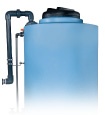It’s easy to get confused between NSF certification, FDA approval, and FDA requirements. Which terms do you need to be familiar with, and what should you expect from your chemical storage tank? These are good questions, and it’s important to understand the differences between NSF and FDA as you prepare to purchase a chemical storage system.
Topics:
Certifications and Standards
Poly Processing is committed to ensuring that our polyethylene chemical storage systems are NSF/ANSI/CAN 61 certified. In our previous article on NSF, we looked at NSF/ANSI/CAN 61 and what it means to be certified. There can be some confusion about whether tanks or tank systems are certified to NSF/ANSI/CAN 61 and which certification is valid for which tank.
Topics:
Certifications and Standards
Municipal projects require detailed specifications for anything purchased as a capital expense. At Poly Processing Company, we’ve teamed up with national engineering firms and municipalities to develop industry leading pre-written engineering specifications for our three most popular polyethylene chemical tanks: the SAFE-Tank®, the vertical tank with IMFO® and the upright vertical storage tank.
Topics:
Certifications and Standards,
Value Added,
Chemical Storage
Most products that come in contact with potable water are tested under NSF 61 with the pH 5, pH 8 and pH 10 exposure waters that are defined in the standard. These exposure waters were designed to simulate the wide variety of potable water chemistries encountered across North America. However, the exposure waters were not designed to predict leaching of materials caused by aggressive chemicals.
Topics:
Certifications and Standards
At first glance, most polyethylene storage tanks look pretty similar. It’s hard to tell the difference between a robust, well-designed tank and an inferior one. Over the years, we've found that many customers aren’t aware of the construction standards for polyethylene tanks, or they believe that all tank manufacturers follow the same standards.
Topics:
Certifications and Standards
It’s hard to judge, with the naked eye, how a polyethylene tank is constructed. On the surface, a tank is just a tank. However, there is a big difference between a well-designed, properly constructed tank and a cheap one that doesn’t meet structural requirements.
Topics:
Certifications and Standards
We get a lot of questions about the standard testing on chemical storage tanks that we do at our facility. Vertical tanks larger than 500 gallons are extensively tested to ensure that they meet ASTM standards. Depending on customers’ needs, we also offer additional testing on our chemical storage tank systems.
Topics:
Certifications and Standards,
Value Added
Are you familiar with the latest updates to the NSF/ANSI 61 standards? We cover everything you need to know in our article featured in the June 2019 edition of Environmental Science & Engineering Magazine.
Topics:
Certifications and Standards
How do you know by looking at a chemical storage tank how well it’s constructed? There’s a big difference between a well-designed, properly constructed tank and an inexpensive one that doesn’t meet structural requirements. But it takes more than the naked eye to spot critical flaws.
Topics:
Certifications and Standards
In this blog we look at how NSF/ANSI 61 certification differs by state and how that impacts tanks and drinking water components throughout the United States. Regardless of your geographic location, Poly Processing is committed to ensuring that our polyethylene storage tank systems are NSF/ANSI 61 certified. So no matter where you are, we can meet your state’s regulations.
Topics:
Certifications and Standards



